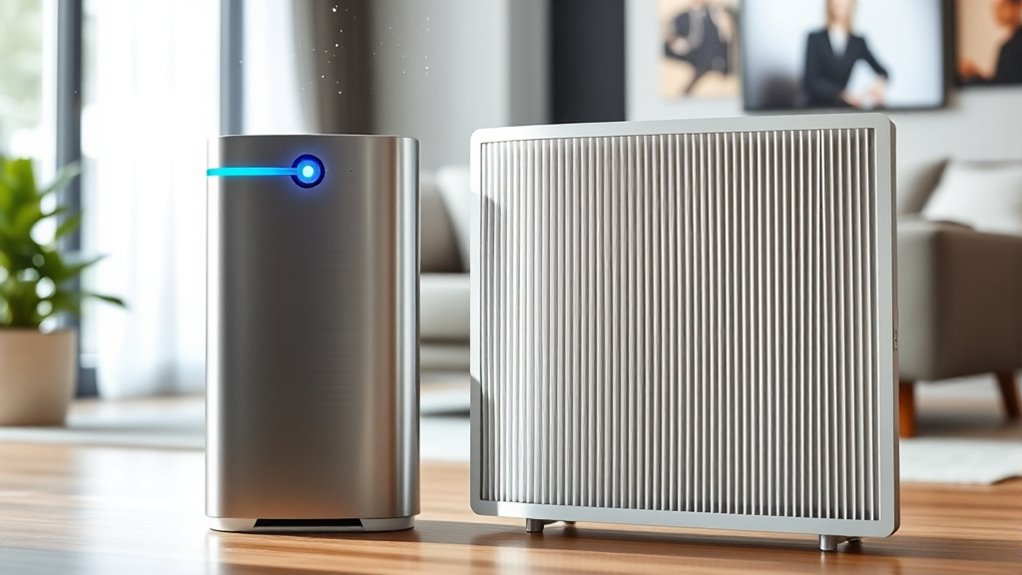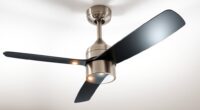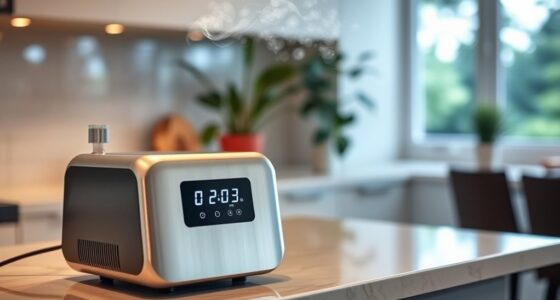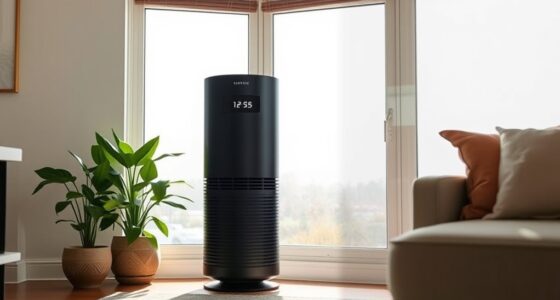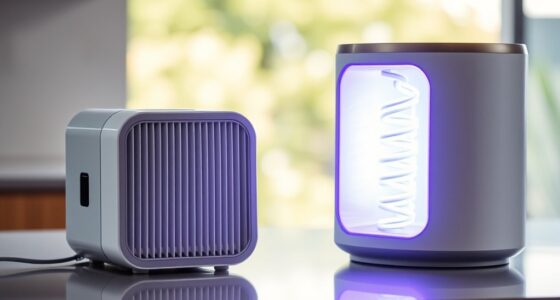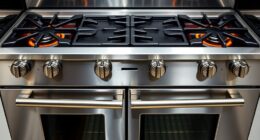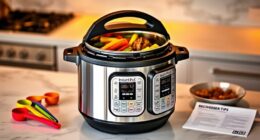If you’re choosing between an ionizer and a true HEPA filter, safety-wise, HEPA filters are a better option for your home. They physically trap pollutants without producing ozone or irritating gases, making them safer for children and allergy sufferers. Ionizers can generate ozone as a byproduct, which might cause respiratory issues over time. Understanding how each works can help you find the safest and most effective way to improve your indoor air quality—keep exploring to learn more.
Key Takeaways
- HEPA filters physically trap airborne particles without producing ozone, making them safer for indoor air quality.
- Ionizers may emit ozone as a byproduct, which can irritate respiratory systems, especially in sensitive individuals.
- HEPA filters provide more comprehensive pollutant removal by capturing particles rather than displacing them.
- Ozone generated by ionizers can worsen asthma symptoms and cause throat irritation over time.
- For safer, effective indoor air purification, HEPA-based filters are generally the better choice.
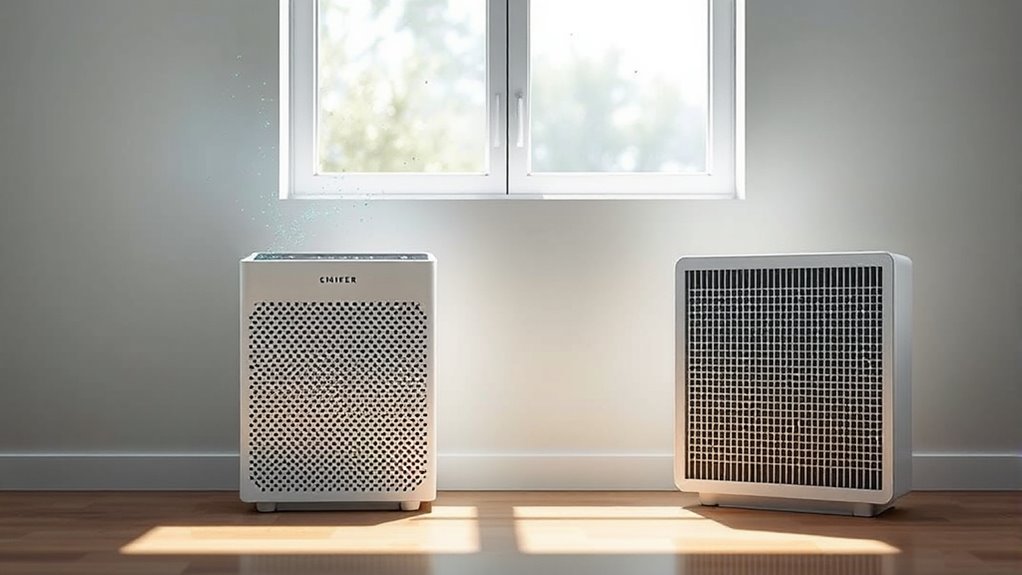
When choosing an air purifier, understanding the differences between ionizers and true HEPA filters is essential. These technologies differ markedly in how they clean the air, and knowing their distinctions helps you make an informed decision about which is safer for your home. Air purifier technology impacts not only how effectively pollutants are removed but also the potential health impacts you should consider.
Ionizers work by releasing negatively charged ions into the air, which attach to airborne particles like dust, pollen, and smoke. These charged particles then settle on surfaces or are attracted to metal plates within the device. While this method can quickly reduce airborne particles, it doesn’t always eliminate them entirely from your environment. Instead, particles are often just moved out of the air, which may still leave some pollutants lingering. Additionally, some ionizers produce ozone as a byproduct, a gas that can irritate your respiratory system and worsen asthma symptoms, especially in sensitive individuals. This ozone production raises concerns about health impacts, as prolonged exposure can lead to throat irritation, coughing, or even more serious respiratory issues.
True HEPA filters, on the other hand, use dense, fibrous filter media capable of trapping at least 99.97% of particles as small as 0.3 microns. This high-efficiency filtration process physically captures pollutants rather than just charging or displacing them. Because of this, true HEPA filters are often considered more effective at removing a wide range of airborne contaminants, including allergens, bacteria, and pet dander. From a health impacts perspective, HEPA filtration offers a safer, more reliable way to improve indoor air quality without the risk of ozone emissions. This means you can confidently use a HEPA-based purifier in bedrooms, living rooms, or spaces with children and allergy sufferers, knowing it’s less likely to cause respiratory irritation.
Frequently Asked Questions
Do Ionizers Produce Ozone That Could Harm Indoor Air Quality?
You might wonder if ionizers produce ozone that could harm indoor air quality. Some ionizers do generate ozone through their ionization process, which can impact indoor safety if levels become too high. It’s crucial to choose models with low or zero ozone emission to protect your indoor air. By doing so, you guarantee that your air purification maintains a healthy environment without risking ozone-related health issues.
How Do True HEPA Filters Handle Airborne Viruses and Bacteria?
True HEPA filters excel in viral removal and bacteria filtration, capturing particles as small as 0.3 microns with 99.97% efficiency. You’ll notice cleaner air and reduced risk of airborne illnesses. These filters trap viruses and bacteria, preventing them from circulating in your home. Unlike ionizers, they don’t produce ozone, making them a safer choice for maintaining healthy indoor air quality. Regular filter changes keep them effective against airborne pathogens.
Are Ionizers More Energy-Efficient Than HEPA Filters?
This debate is like comparing a speedboat to a cruise ship! Ionizers often use less energy, making them more power-efficient than HEPA filters, which can consume more energy due to their dense filter media. If you’re looking to cut down on energy consumption and save on electricity bills, ionizers might be the better choice. However, consider their effectiveness alongside power efficiency to find what fits your home best.
Can Ionizers Eliminate Odors Better Than HEPA Filters?
You might wonder if ionizers can eliminate odors better than HEPA filters. While ionizers help with air freshening by charging particles for easier removal, they’re not as effective at odor absorption compared to HEPA filters, which trap airborne particles, including some odor-causing molecules. For better odor control, consider combining an ionizer with a filter designed for odor absorption, ensuring your home’s air stays fresh and clean.
Which Air Purifier Type Requires Less Maintenance Over Time?
Imagine your air purifier as a loyal guardian—some need constant armor, others require less. You’ll find that ionizers typically demand lower maintenance costs since they don’t use replaceable filters. True HEPA filters, however, need regular filter replacements, which can add up over time. So, if you prefer fewer upkeep worries, an ionizer might be your best bet, saving you money on filter replacements and ongoing maintenance costs.
Conclusion
Imagine you’re allergy-prone and want a safer option for clean air. If you choose a True HEPA filter, it traps tiny particles, including pollen and pet dander, providing reliable filtration. For instance, Sarah used a HEPA purifier and noticed her allergy symptoms eased within days. Ionizers, while they can reduce airborne particles, might produce ozone, which can irritate your lungs. So, for safer, cleaner air, a True HEPA filter often offers the most peace of mind.
